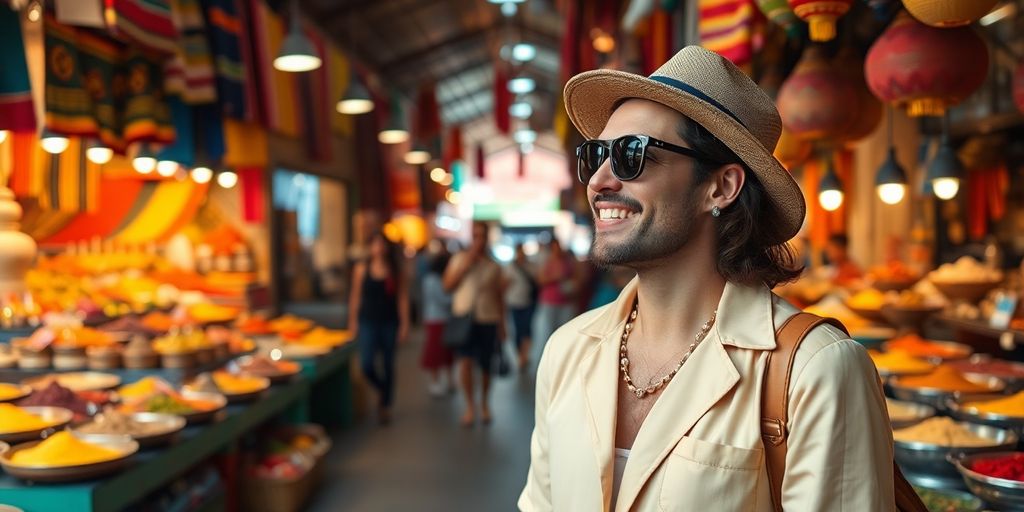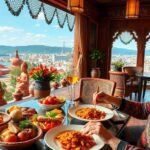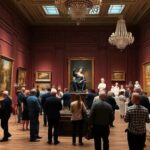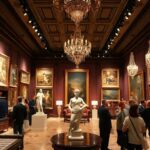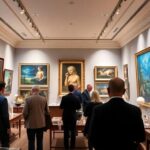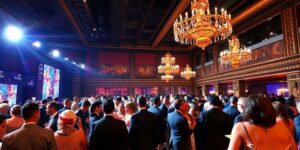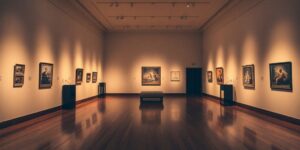Ever wondered how the ultra-wealthy soak up local cultures? It’s not just about fancy hotels or luxury cars. These folks dive deep into cultural experiences but with a twist of exclusivity. Whether it’s private art gallery tours or dining with top chefs, the rich have their unique ways of connecting with different cultures.
Key Takeaways
- The ultra-wealthy prefer private and exclusive experiences to explore local cultures.
- Luxury travel plays a significant role in how elites engage with cultural immersion.
- Art and heritage hold a special place in elite cultural experiences, often accessed through exclusive events.
- Gastronomy is a key element, with the rich enjoying private tastings and cooking classes.
- There’s a growing emphasis on sustainable and responsible tourism among the elite.
Exploring Cultural Immersion for Elites Through Exclusive Experiences
Private Tours of Historical Landmarks
For the ultra-wealthy, exploring historical landmarks isn’t just about seeing the sights. It’s about having the entire place to themselves, often after hours. Imagine wandering through the halls of the Louvre without the crowds, or having a personal historian guide you through the ancient ruins of Machu Picchu. These private tours offer a unique perspective on history, providing insights and stories that aren’t available to the general public. The experience is tailored to the interests of the individual, ensuring a deeper connection with the past.
Gourmet Dining with Local Chefs
Dining for the elite isn’t just about the food; it’s an experience. Imagine a renowned local chef crafting a meal just for you, using ingredients sourced from the surrounding area. This isn’t your typical restaurant experience—it’s a private dining event where the chef explains each dish’s cultural significance and preparation method. The setting could be a secluded beach, a vineyard, or even a historical site, making the meal not just a feast for the palate but also for the senses.
Artisanal Craft Workshops
Engaging with local artisans provides a hands-on way to connect with culture. The ultra-wealthy often have exclusive access to workshops where they can learn traditional crafts directly from the masters. Whether it’s pottery in Japan, weaving in Peru, or glassblowing in Italy, these workshops offer a chance to create something unique while learning about the cultural heritage behind the craft. It’s not just about making a souvenir; it’s about understanding the artistry and tradition that goes into each piece.
These exclusive experiences allow the wealthy to dive deeper into the culture, offering them a richer, more personal connection to the places they visit. It’s about creating memories that go beyond the typical tourist experience, making their travels truly unforgettable.
The Role of Luxury Travel in Cultural Immersion for Elites
Luxury travel is not just about opulence; it’s a gateway for the ultra-wealthy to dive deep into local cultures while maintaining their comfort and exclusivity. Let’s explore how elite travelers engage with cultural experiences through luxury travel.
Chartered Yachts and Private Jets
For the affluent, the journey is as important as the destination. Chartered yachts and private jets provide the ultimate in privacy and convenience, allowing travelers to explore remote locations without the hassle of commercial travel. Imagine sailing around the Greek Isles on a private yacht, stopping at secluded beaches that are inaccessible to the average tourist. Or, consider the ease of flying directly to a small island in the Maldives on a private jet, bypassing the long layovers and crowded airports.
Luxury Safari Adventures
A luxury safari offers a unique way to connect with nature and culture. These adventures are not your typical safari. They often include accommodations in lavish lodges with gourmet dining and personal guides who tailor the experience to your interests. Whether it’s witnessing the Great Migration in Tanzania or tracking gorillas in Rwanda, these safaris provide a front-row seat to some of the world’s most spectacular wildlife events, all while ensuring comfort and safety.
Exclusive Island Retreats
Exclusive island retreats offer a perfect blend of relaxation and cultural immersion. These retreats often come with private villas, personal chefs, and curated cultural experiences such as local dance performances or art classes. They provide a sanctuary where the elite can unwind and engage with the local culture in a setting that’s both beautiful and private.
Luxury travel is more than just a vacation; it’s a way for the elite to experience the world on their own terms, blending comfort with cultural engagement. It’s about finding that perfect balance between indulgence and authenticity, where every journey becomes a story worth telling.
Cultural Immersion for Elites: A Focus on Art and Heritage
Private Art Gallery Viewings
For the ultra-wealthy, art isn’t just about owning pieces—it’s about experiencing them intimately. Private viewings at exclusive galleries offer a chance to appreciate art without the usual crowds. Imagine sipping a glass of vintage wine while a curator walks you through the gallery, explaining each piece’s history and significance. This isn’t just a tour; it’s a personalized journey through art, tailored to your tastes and interests.
Exclusive Museum Access
Museums, often bustling with visitors, open their doors to a select few for after-hours access. This exclusive entry allows for a quiet, personalized exploration of exhibits. It’s about connecting deeply with history and culture in a serene setting. Whether it’s a famed museum in Paris or a hidden gem in Tokyo, the experience is uniquely yours, offering a deeper understanding of cultural narratives.
Participation in Cultural Festivals
Immersing oneself in local traditions is a unique way to understand a region’s heritage. Elites often participate in cultural festivals, not as mere spectators but as honored guests. They might join traditional dances, sample local cuisines, or even participate in ceremonies that are usually closed to outsiders. This level of engagement offers a rich and authentic experience, providing insights into the community’s way of life.
For the wealthy, cultural immersion isn’t just a pastime—it’s a way to connect with the world on a deeper level, blending luxury with genuine cultural appreciation. This approach to travel transforms a simple visit into a meaningful journey, enriching both the travelers and the communities they engage with.
Gastronomy as a Gateway to Cultural Immersion for Elites

Tasting Menus by Renowned Chefs
The ultra-wealthy often indulge in tasting menus curated by world-renowned chefs. These culinary experiences go beyond mere dining—they’re a journey through flavors, textures, and presentations that reflect the essence of a region’s culture. Imagine a seven-course meal in Tuscany, where each dish tells a story of local ingredients and traditional techniques. Such experiences are not just about eating but about connecting with the cultural heritage of a place.
Wine Tasting in Exclusive Vineyards
For those with a taste for fine wines, exclusive vineyard tours offer a unique way to experience local culture. Hidden away from the usual tourist trails, these vineyards provide private tastings of rare vintages, often paired with local delicacies. It’s an intimate setting where guests can learn about the winemaking process, the history of the vineyard, and the stories behind each bottle, making it a truly immersive cultural experience.
- Private vineyard tours: Away from the crowds, offering a personal touch.
- Rare vintage tastings: Savor wines that are not available to the general public.
- Local delicacy pairings: Enjoy food that complements the wine, enhancing the tasting experience.
Cooking Classes with Local Experts
Cooking classes with local chefs offer a hands-on approach to understanding a region’s culinary traditions. Participants get to explore local markets, select fresh ingredients, and learn to prepare traditional dishes. It’s a chance to engage with the local community and gain insight into their way of life through the universal language of food.
"Cooking is an art, but it’s also a window into the soul of a culture. By learning to cook local dishes, the elite not only acquire new skills but also a deeper appreciation for the cultural nuances of the places they visit."
The elite’s pursuit of culinary experiences is not just about luxury; it’s about meaningful connections with the cultures they explore. Whether through tasting menus, exclusive wine tours, or immersive cooking classes, gastronomy serves as a powerful gateway to understanding and appreciating the world’s diverse cultures.
The Influence of Global Education on Elite Cultural Experiences

International Boarding Schools
For the ultra-wealthy, international boarding schools aren’t just about education—they’re about building a global network. These institutions offer more than academics; they provide a unique environment where students from diverse backgrounds come together. This exposure to different cultures and ideas shapes their worldview, preparing them to navigate and appreciate global cultures with ease. Boarding schools often emphasize cultural exchange, encouraging students to engage in activities that celebrate various traditions and customs.
Cultural Exchange Programs
Cultural exchange programs for elites go beyond mere travel; they are immersive experiences that foster genuine understanding. Participants live with host families, attend local schools, and actively participate in community events. This hands-on approach allows them to experience daily life in a new culture, creating lasting connections and a deeper appreciation for global diversity. These programs can also include internships or volunteer opportunities, providing practical insights into the host country’s socio-economic landscape.
Language Immersion Courses
Language immersion is a gateway to cultural understanding. For the affluent, learning a language isn’t just about communication; it’s about connecting with people on a deeper level. Immersion courses often take place in the country where the language is spoken, offering students the chance to practice in real-life situations. This method not only enhances linguistic skills but also enriches cultural sensitivity, allowing participants to engage more meaningfully with local traditions and customs.
"In today’s interconnected world, the ability to understand and appreciate different cultures is not just a luxury; it’s a necessity. For the elite, global education is a key to unlocking the world, offering experiences that go beyond borders and foster a genuine appreciation for diversity."
Sustainable Luxury: Eco-Conscious Cultural Immersion for Elites

In the world of luxury travel, a new trend is emerging where the ultra-wealthy are seeking experiences that not only offer opulence but also align with eco-conscious values. This shift towards sustainable luxury reflects a growing awareness of environmental and social responsibilities among elites.
Eco-Friendly Luxury Resorts
Luxury resorts are increasingly adopting green practices to attract eco-conscious travelers. These resorts are integrating renewable energy sources, such as solar and wind power, and implementing water conservation measures. Some even offer organic toiletries and locally sourced amenities to ensure minimal environmental impact. The commitment to sustainability doesn’t compromise luxury but enhances the experience by connecting guests to nature.
Conservation-Focused Experiences
Elite travelers are now opting for experiences that support conservation efforts. This includes guided tours in wildlife reserves where part of the proceeds go towards protecting endangered species. In some cases, guests can participate in hands-on conservation activities, such as planting trees or assisting in wildlife research projects. These experiences offer a deeper connection to the natural world and a sense of contributing to its preservation.
Organic Farm-to-Table Dining
Gastronomy plays a significant role in sustainable luxury. Many high-end restaurants at luxury destinations are embracing the farm-to-table movement, sourcing ingredients from local organic farms. This not only ensures the freshest produce but also supports local agriculture and reduces carbon footprints. Diners can enjoy exquisite meals knowing that their choices are supporting sustainable practices.
Embracing sustainable luxury is more than a trend; it’s a commitment to preserving the beauty and resources of our planet while enjoying the finest experiences it has to offer. The ultra-wealthy are leading the way, proving that luxury and sustainability can coexist harmoniously.
The Intersection of Wealth and Cultural Preservation
Philanthropy in Cultural Heritage
The ultra-wealthy often play a significant role in preserving cultural heritage through philanthropy. Their financial contributions can be pivotal in restoring ancient sites, funding museums, and supporting cultural festivals. This involvement not only helps maintain cultural landmarks but also enhances their personal legacies as patrons of the arts. However, the impact of their investments can sometimes be double-edged, as it may lead to increased tourism, which can strain local resources and alter the cultural landscape.
Investments in Local Artisans
Wealthy individuals frequently invest in local artisans, helping to keep traditional crafts alive. These investments provide artisans with the resources needed to continue their craft, often leading to a resurgence of interest in handmade goods. This support can also create economic opportunities within communities, promoting sustainable development. Yet, the commercialization of these crafts can sometimes strip them of their original cultural significance, turning them into mere commodities for the affluent.
Support for Indigenous Communities
Supporting indigenous communities is another way the wealthy contribute to cultural preservation. By funding educational programs, healthcare, and infrastructure projects, they help these communities maintain their cultural identity while improving their quality of life. However, such support must be approached with sensitivity to avoid imposing external values and disrupting traditional ways of life.
The wealthy have the unique ability to both preserve and transform cultural landscapes. Their actions can lead to a renaissance of cultural appreciation, but they must tread carefully to ensure their influence respects and empowers the communities they aim to support.
Cultural Immersion for Elites in Emerging Markets
Exploring Untouched Destinations
The ultra-wealthy have a knack for finding the world’s hidden treasures, often venturing into untouched destinations. These places offer a sense of exclusivity and adventure, far from the bustling tourist spots. Think of remote islands, secluded mountains, and untouched rural landscapes. For the affluent traveler, it’s not just about visiting a place—it’s about experiencing its essence. They often charter private jets and yachts to reach these spots, ensuring privacy and comfort during their travels. Luxury travel is increasingly popular among affluent travelers seeking unique experiences, with bespoke itineraries crafted to cater to their desires.
Engaging with Local Entrepreneurs
In emerging markets, engaging with local entrepreneurs is a unique way for the ultra-wealthy to immerse themselves in the culture. These interactions often lead to collaborations that benefit both parties. The wealthy bring investment and expertise, while local entrepreneurs offer fresh perspectives and innovative ideas. This exchange fosters a deeper understanding of the region’s economic landscape and provides opportunities for meaningful connections.
Participating in Traditional Ceremonies
Experiencing traditional ceremonies firsthand offers a profound cultural insight that can’t be replicated in more commercial settings. Whether it’s a tribal dance, a local festival, or a religious rite, participation in these events allows the elite to connect with the community on a personal level. Such experiences are often facilitated by exclusive travel agencies and local connections, providing private performances that immerse travelers in local traditions. These intimate gatherings offer a glimpse into the heart of a culture, creating memories that last a lifetime.
In emerging markets, cultural immersion for the ultra-wealthy isn’t just about luxury and comfort; it’s about forging genuine connections and understanding the world through a different lens. By stepping away from the beaten path, they discover the beauty and richness of cultures that remain untouched by mainstream tourism.
The Evolution of Luxury: From Materialism to Experiential Capital

Prioritizing Experiences Over Possessions
In today’s world, luxury isn’t just about owning the latest designer handbag or driving a flashy car. It’s about collecting experiences that enrich one’s life. The wealthy are shifting their focus from material goods to meaningful interactions and personal growth. They seek unique adventures that offer a deeper connection to the world around them. This shift is evident in how luxury travel has evolved, emphasizing unforgettable experiences, sustainability, and personal well-being. For instance, travelers now prioritize eco-friendly options and rare, memorable experiences, reflecting a growing demand for responsible tourism.
The Rise of Inconspicuous Consumption
Gone are the days when wealth was flaunted through conspicuous consumption. Today, the affluent prefer more subtle ways of displaying their status. This "inconspicuous consumption" involves investing in education, health, and cultural capital. The elite now value knowledge and personal development over flashy displays of wealth, choosing to spend on services and experiences that enhance their quality of life. This trend is particularly noticeable in bespoke travel services, which offer personalized experiences tailored to individual preferences, emphasizing customization and exclusive access.
Investing in Personal Growth and Well-being
The modern luxury consumer is more interested in self-improvement and well-being than ever before. They invest in personal growth, seeking experiences that align with their aspirations and values. This includes engaging in cultural immersion, participating in wellness retreats, and supporting sustainable practices. By prioritizing these elements, the wealthy not only enhance their own lives but also contribute positively to society. This evolution in luxury reflects a broader trend towards a more inclusive and personal concept of wealth, where experiences hold more value than material possessions.
As luxury continues to redefine itself, the focus is increasingly on creating personal, meaningful experiences rather than merely showcasing wealth. This shift towards experiential capital marks a new era in luxury, where the true measure of wealth is found in the richness of one’s experiences and the impact they have on the world.
The Impact of Technology on Elite Cultural Experiences
Virtual Reality Cultural Tours
Virtual reality (VR) has opened up a whole new world for those who can afford it. The ultra-wealthy are using VR to explore destinations and cultures without leaving their luxurious homes. Imagine walking through the ancient streets of Rome or the bustling markets of Marrakech, all from your living room. VR offers an immersive experience that traditional travel can’t match, allowing users to engage with cultural sites in a deeply personal way. This tech isn’t just a novelty; it’s a tool for those who want to experience the world in a unique manner.
Digital Art and NFT Collections
The art world is evolving, and the affluent are at the forefront of this change. Digital art and NFTs (Non-Fungible Tokens) are becoming a staple in luxury collections. Collectors are purchasing digital pieces that can be displayed on high-tech screens or stored in digital wallets. This shift not only changes how art is owned but also how it’s valued. The exclusivity of NFTs, with their unique blockchain-backed ownership, appeals to those who appreciate both art and technology.
Smart Home Integration in Luxury Travel
Luxury travel isn’t just about the destination anymore; it’s about how seamlessly technology can integrate into the experience. Smart homes and accommodations offer a level of convenience and personalization that is highly sought after by elite travelers. From automated lighting and climate control to voice-activated concierge services, these tech advancements ensure that comfort is paramount. This integration of smart technology into travel reflects a broader trend towards creating bespoke experiences that cater to individual preferences.
In a world where time is the ultimate luxury, technology provides the ultra-wealthy with the ability to explore, collect, and experience culture in ways that were once unimaginable. As tech continues to evolve, so too will the ways in which the elite engage with the world around them.
Cultural Immersion for Elites: A New Era of Social Responsibility
Ethical Tourism Practices
Ethical tourism is becoming more than just a buzzword among the elite. These travelers are increasingly aware of their impact on local communities and the environment. They are opting for vacations that promise not just luxury but also a sense of responsibility. Whether it’s staying at eco-friendly resorts or participating in community-based tourism projects, the ultra-wealthy are finding ways to give back while enjoying their travels.
- Choosing accommodations that prioritize sustainable practices
- Participating in tours that support local communities
- Engaging in wildlife conservation efforts
Community Engagement Initiatives
The affluent are now more involved in community engagement during their travels. This goes beyond just visiting a place; it involves actively participating in local projects. From helping build schools to supporting local artisans, these initiatives allow travelers to leave a positive footprint. This trend reflects a shift from mere consumption to meaningful interaction.
- Volunteering in local educational projects
- Supporting local businesses by purchasing handmade goods
- Investing in community infrastructure
Sustainable Investment Strategies
Investing in sustainability is no longer an option but a necessity for the elite. They are channeling their resources into projects that promise long-term benefits for both the planet and its people. By supporting sustainable agriculture, renewable energy, and eco-friendly technologies, these investments are paving the way for a greener future.
As the world becomes more connected, the responsibility to travel ethically and sustainably becomes a shared journey. The ultra-wealthy, with their resources and influence, have a unique opportunity to lead by example, ensuring that their cultural immersion is both enriching and responsible.
The luxury travel experiences offered today are not just about indulgence but also about making a positive impact. With a focus on sustainability and personalized experiences, the elite are redefining what it means to travel responsibly.
In today’s world, cultural experiences are not just for the privileged few; they are essential for everyone. By engaging with different cultures, we can foster understanding and compassion. Join us in this journey of cultural immersion and discover how you can make a difference. Visit our website to learn more about how you can be part of this exciting movement!
Conclusion
In the end, the ultra-wealthy have found unique ways to immerse themselves in local cultures, blending luxury with authenticity. They seek experiences that go beyond the typical tourist path, often engaging with communities in ways that are both meaningful and exclusive. This lifestyle isn’t just about opulence; it’s about crafting a narrative of personal fulfillment and cultural appreciation. While their approach might seem extravagant, it reflects a broader trend of valuing experiences over possessions. As they continue to explore the world in style, the ultra-rich redefine what it means to truly experience a culture, leaving a lasting impact on the places they visit and the people they meet.
Frequently Asked Questions
What is cultural immersion for the ultra-wealthy?
Cultural immersion for the ultra-wealthy involves experiencing local cultures in a luxurious and exclusive way, often through private tours, gourmet dining, and access to exclusive events.
How do the ultra-wealthy travel to experience different cultures?
The ultra-wealthy often use private jets, chartered yachts, and luxury safaris to travel in style and comfort while exploring different cultures.
Do the ultra-wealthy contribute to cultural preservation?
Yes, many ultra-wealthy individuals invest in local artisans, support indigenous communities, and participate in philanthropy focused on cultural heritage preservation.
How do luxury experiences differ in emerging markets?
In emerging markets, the ultra-wealthy may explore untouched destinations, engage with local entrepreneurs, and participate in traditional ceremonies for a unique cultural experience.
What role does technology play in luxury cultural experiences?
Technology enhances luxury cultural experiences through virtual reality tours, digital art collections, and smart home integrations in luxury travel accommodations.
How is gastronomy a part of cultural immersion for the wealthy?
Gastronomy plays a key role as the ultra-wealthy enjoy tasting menus by renowned chefs, wine tasting in exclusive vineyards, and cooking classes with local experts.
Is there a focus on sustainability in luxury cultural experiences?
Yes, sustainable luxury is important, with eco-friendly resorts, conservation-focused experiences, and organic farm-to-table dining being popular among the ultra-wealthy.
How do global education and cultural exchange influence the ultra-wealthy?
Global education and cultural exchange programs expose the ultra-wealthy to diverse cultures, enhancing their appreciation for cultural immersion and responsible luxury travel.

